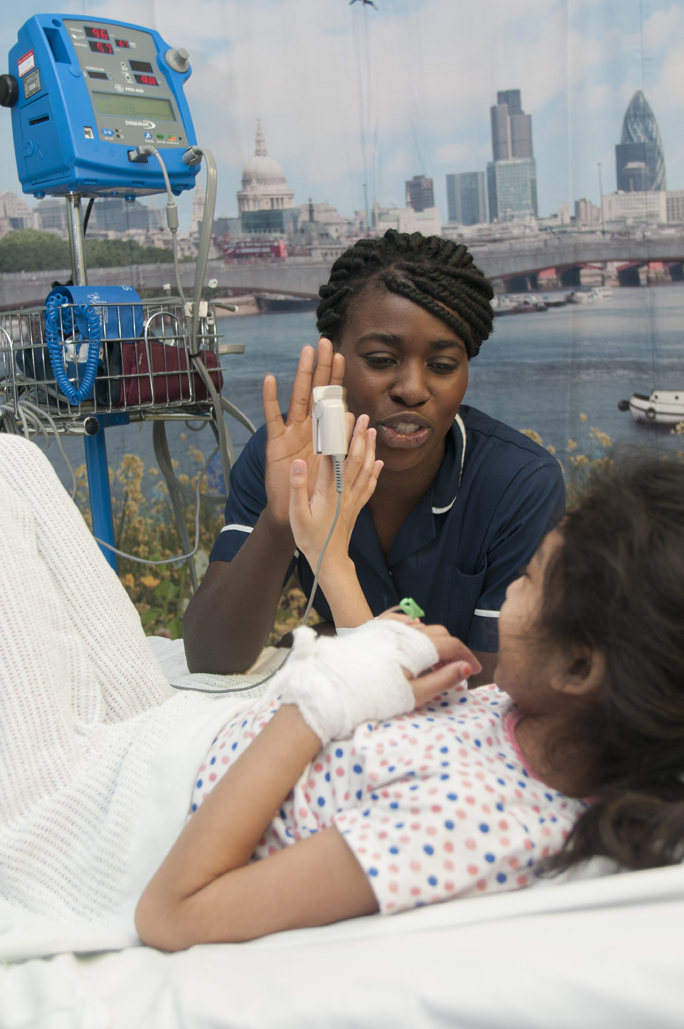Young people support hospital staff to talk about mental health

Young people with mental health conditions are helping to train hospital staff to better support others in crisis when they are receiving urgent medical treatment.
A survey at Barts Health NHS Trust found many staff felt unable to respond effectively to the mental health needs of children and young people requiring hospital treatment for self-harm, overdose, anxiety and depression.
One in five of the 350 staff surveyed said they encountered young people with mental health conditions almost all the time, and the overwhelming majority said they would like to improve their own skills in this area.
Barts Health is the largest NHS trust in the country and runs three children’s A&E departments at The Royal London, Newham and Whipps Cross hospitals. Mental health services for children and young people across east London are provided by two specialist NHS trusts, but many will often attend A&E when in crisis.
The number of children and young people in England being referred for specialist mental health support has risen by 22,000 over the last three years*.
With the support of the Healthy Teen Minds and Common Room organisations and mental health professionals, the Trust has developed a training toolkit for hospital staff believed to be the only programme of its kind in the NHS. So far over 150 staff have attended the ‘We Can Talk’ one-day training session, including children's nurses, health care assistants, doctors and ward clerks. All attendees recommended the training, and 96 per cent reported it would make a big difference to the way they do their job.
"From what I have seen and heard in the sessions staff really care and want to support people better, and I am thrilled to be helping to make this happen." Grace, young advisor
As the largest NHS trust, with three children’s A&Es caring for half a million children and young people in east London, it is likely the findings reflect the feeling of NHS staff across the country.
Michelle Johnson, Director of nursing for children, babies and young people at Barts Health NHS Trust explained: “I heard from many staff that they are caring for more children and young people with mental health problems than ever before, but lacked confidence and resilience to care for and meet their needs. Aiming to support staff to give the best possible care, we did something quite unique by taking the views of young people together with mental health professionals to create ten core competencies and a bespoke training course that is actually led by a young person.”
When young people were asked what hospital staff need to know about mental health, many felt there was a lack of knowledge of mental health issues. They said the attitudes and behaviour of staff had a great impact on their experience of care.
Grace Jeremy, aged 24, is a young advisor with Common Room. Grace now leads the staff training sessions, sharing her experiences and the views of other young people.
Grace said: “Young people want hospital staff to acknowledge and address their mental health needs. The majority prefer to self-treat when possible as they have had bad hospital experiences in the past. What’s really sad is that many say when they attend A&E they do so with feelings of shame and unworthiness.
“Young people in a mental health crisis attending A&E want exactly what anyone attending A&E would want; appropriate care, to be involved in decisions, empathy, understanding and a non-judgmental approach. From what I have seen and heard in the sessions staff really care and want to support people better, and I am thrilled to be helping to make this happen.”
Robin Barker, senior nurse and director at Healthy Teen Minds said:
“This is a uniquely collaborative and exciting approach to the training - listening to mental health professionals, asking staff about their training needs and speaking to young people. Mental health can be awkward to talk about, and sometimes we don’t know what to say. So in the training sessions we practice communication, looking at how well staff understand mental health problems and some of the difficulties they encounter in a space where they feel supported to really improve their skills.”
Notes to Editor:
*NHS England, March 2017, https://www.england.nhs.uk/2017/03/nhs-acts-to-cut-inappropriate-out-of-area-placements-for-children-and-young-people-in-mental-health-crisis/
